IBUS2302: ERP in HRM - A Critique of a Globalisation Trend in Business
VerifiedAdded on 2022/09/14
|5
|1050
|43
Report
AI Summary
This report examines the impending trend of Enterprise Resource Planning (ERP) in Human Resource Management (HRM) within multinational enterprises, highlighting its characteristics such as performance evaluation, attendance management, and employee databases. It discusses the benefits, including streamlined data access and improved HR management, while also addressing challenges such as inadequate employee training and compensation mechanisms. The report further explores the role of ERP in HR modules in recruitment, training, and workforce planning, emphasizing its impact on talent attraction and retention. The analysis covers how ERP can improve recruitment processes, optimize workforce planning, and enhance training and development, ultimately contributing to better employee management and organizational success. The report also references various sources to support the arguments.
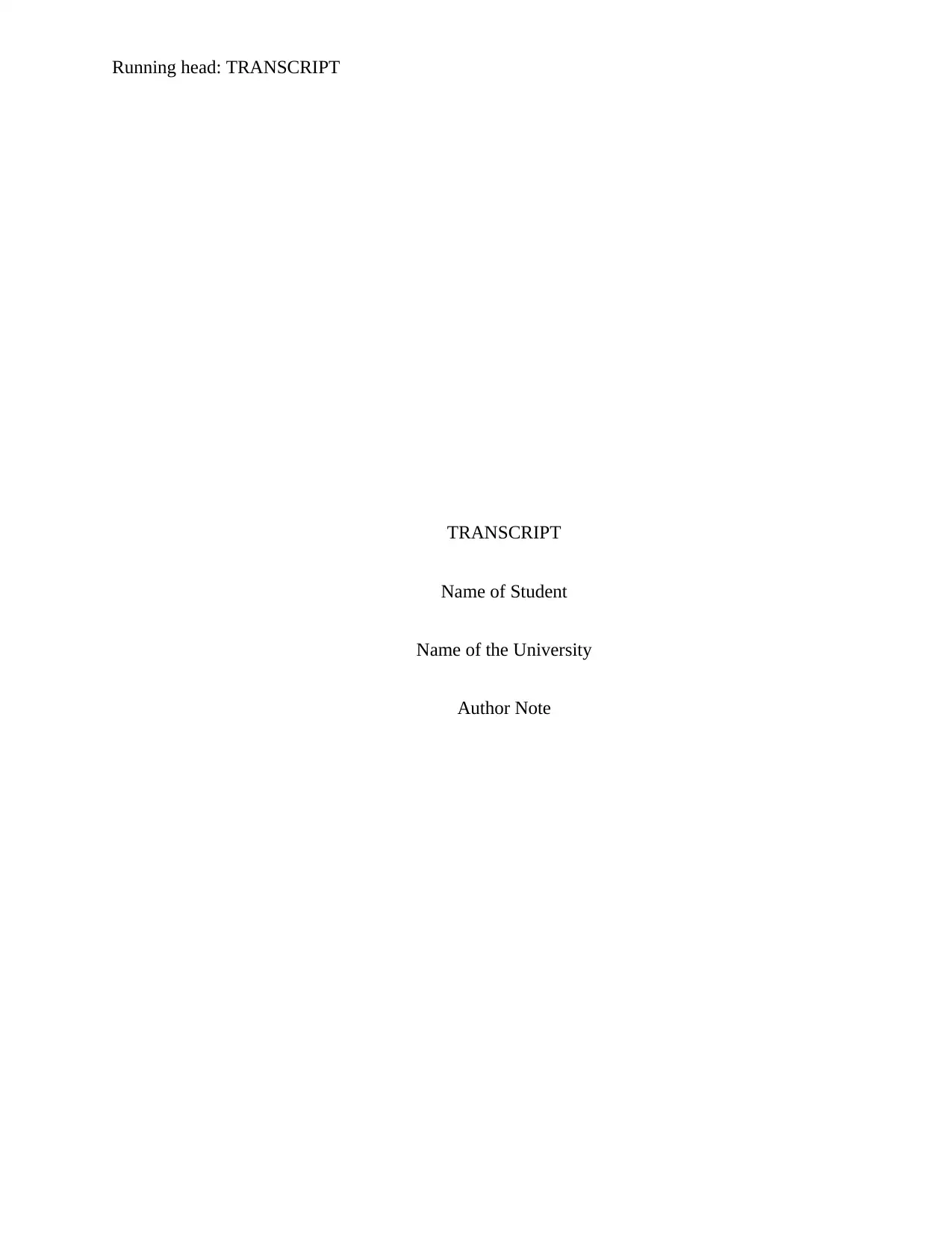
Running head: TRANSCRIPT
TRANSCRIPT
Name of Student
Name of the University
Author Note
TRANSCRIPT
Name of Student
Name of the University
Author Note
Paraphrase This Document
Need a fresh take? Get an instant paraphrase of this document with our AI Paraphraser
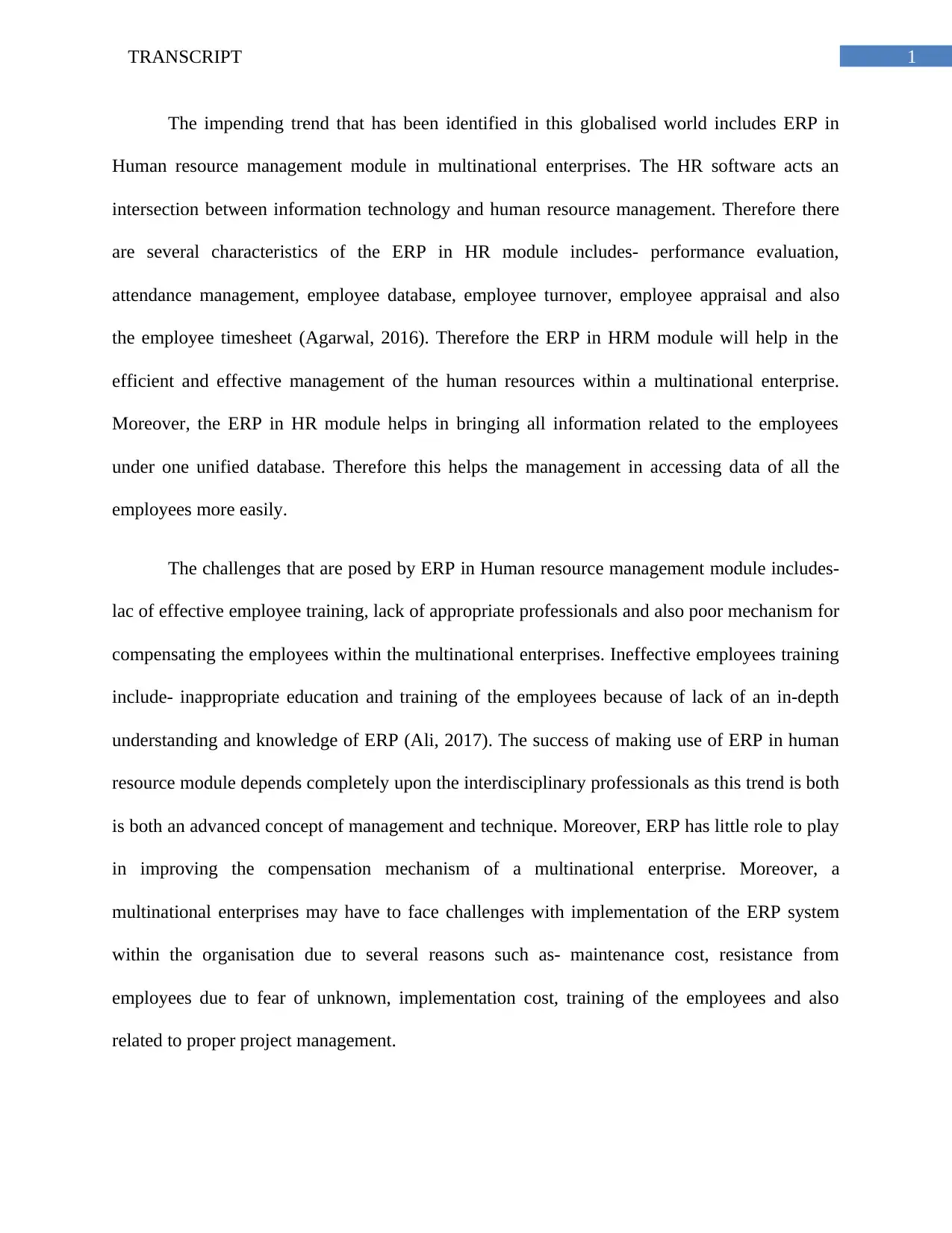
1TRANSCRIPT
The impending trend that has been identified in this globalised world includes ERP in
Human resource management module in multinational enterprises. The HR software acts an
intersection between information technology and human resource management. Therefore there
are several characteristics of the ERP in HR module includes- performance evaluation,
attendance management, employee database, employee turnover, employee appraisal and also
the employee timesheet (Agarwal, 2016). Therefore the ERP in HRM module will help in the
efficient and effective management of the human resources within a multinational enterprise.
Moreover, the ERP in HR module helps in bringing all information related to the employees
under one unified database. Therefore this helps the management in accessing data of all the
employees more easily.
The challenges that are posed by ERP in Human resource management module includes-
lac of effective employee training, lack of appropriate professionals and also poor mechanism for
compensating the employees within the multinational enterprises. Ineffective employees training
include- inappropriate education and training of the employees because of lack of an in-depth
understanding and knowledge of ERP (Ali, 2017). The success of making use of ERP in human
resource module depends completely upon the interdisciplinary professionals as this trend is both
is both an advanced concept of management and technique. Moreover, ERP has little role to play
in improving the compensation mechanism of a multinational enterprise. Moreover, a
multinational enterprises may have to face challenges with implementation of the ERP system
within the organisation due to several reasons such as- maintenance cost, resistance from
employees due to fear of unknown, implementation cost, training of the employees and also
related to proper project management.
The impending trend that has been identified in this globalised world includes ERP in
Human resource management module in multinational enterprises. The HR software acts an
intersection between information technology and human resource management. Therefore there
are several characteristics of the ERP in HR module includes- performance evaluation,
attendance management, employee database, employee turnover, employee appraisal and also
the employee timesheet (Agarwal, 2016). Therefore the ERP in HRM module will help in the
efficient and effective management of the human resources within a multinational enterprise.
Moreover, the ERP in HR module helps in bringing all information related to the employees
under one unified database. Therefore this helps the management in accessing data of all the
employees more easily.
The challenges that are posed by ERP in Human resource management module includes-
lac of effective employee training, lack of appropriate professionals and also poor mechanism for
compensating the employees within the multinational enterprises. Ineffective employees training
include- inappropriate education and training of the employees because of lack of an in-depth
understanding and knowledge of ERP (Ali, 2017). The success of making use of ERP in human
resource module depends completely upon the interdisciplinary professionals as this trend is both
is both an advanced concept of management and technique. Moreover, ERP has little role to play
in improving the compensation mechanism of a multinational enterprise. Moreover, a
multinational enterprises may have to face challenges with implementation of the ERP system
within the organisation due to several reasons such as- maintenance cost, resistance from
employees due to fear of unknown, implementation cost, training of the employees and also
related to proper project management.
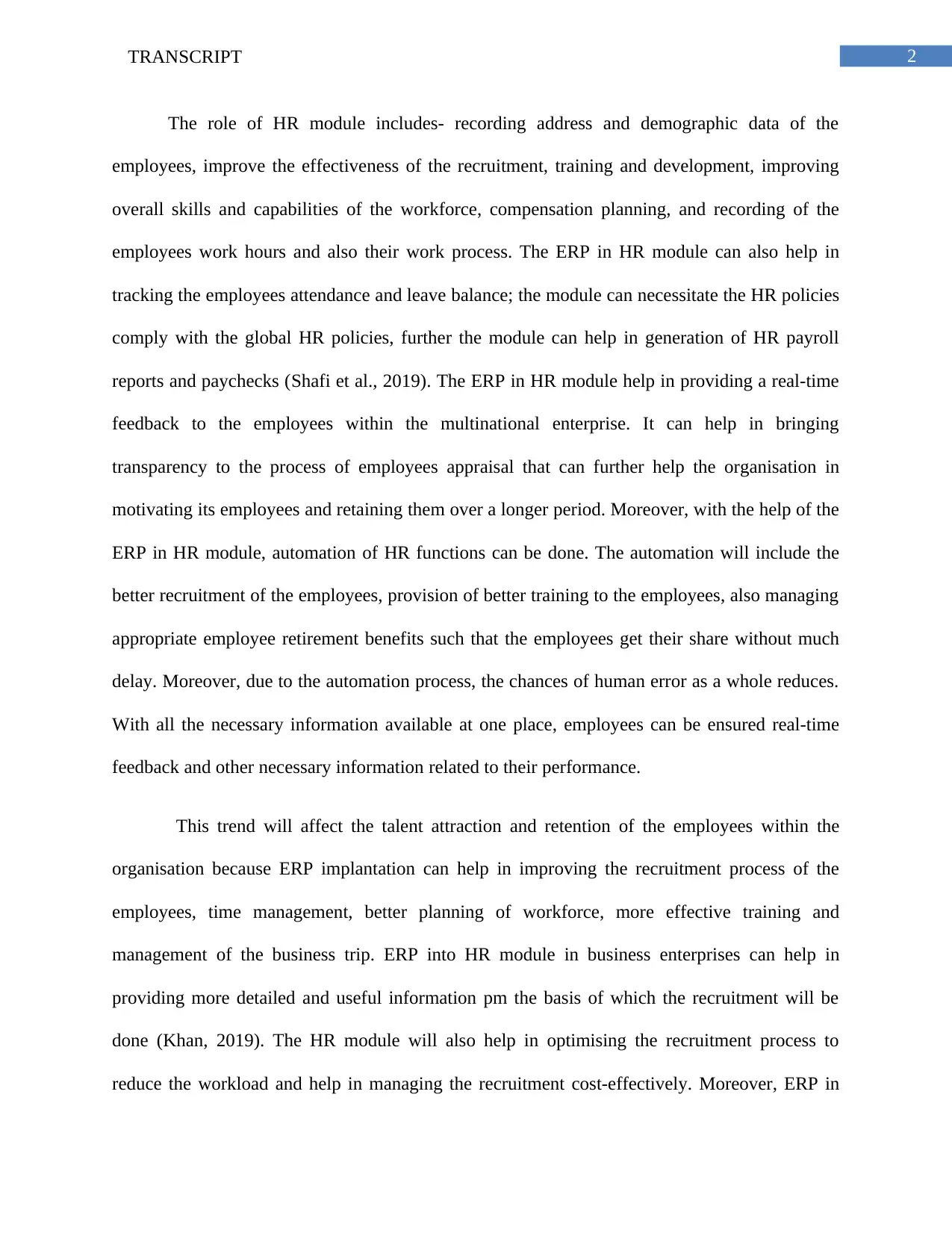
2TRANSCRIPT
The role of HR module includes- recording address and demographic data of the
employees, improve the effectiveness of the recruitment, training and development, improving
overall skills and capabilities of the workforce, compensation planning, and recording of the
employees work hours and also their work process. The ERP in HR module can also help in
tracking the employees attendance and leave balance; the module can necessitate the HR policies
comply with the global HR policies, further the module can help in generation of HR payroll
reports and paychecks (Shafi et al., 2019). The ERP in HR module help in providing a real-time
feedback to the employees within the multinational enterprise. It can help in bringing
transparency to the process of employees appraisal that can further help the organisation in
motivating its employees and retaining them over a longer period. Moreover, with the help of the
ERP in HR module, automation of HR functions can be done. The automation will include the
better recruitment of the employees, provision of better training to the employees, also managing
appropriate employee retirement benefits such that the employees get their share without much
delay. Moreover, due to the automation process, the chances of human error as a whole reduces.
With all the necessary information available at one place, employees can be ensured real-time
feedback and other necessary information related to their performance.
This trend will affect the talent attraction and retention of the employees within the
organisation because ERP implantation can help in improving the recruitment process of the
employees, time management, better planning of workforce, more effective training and
management of the business trip. ERP into HR module in business enterprises can help in
providing more detailed and useful information pm the basis of which the recruitment will be
done (Khan, 2019). The HR module will also help in optimising the recruitment process to
reduce the workload and help in managing the recruitment cost-effectively. Moreover, ERP in
The role of HR module includes- recording address and demographic data of the
employees, improve the effectiveness of the recruitment, training and development, improving
overall skills and capabilities of the workforce, compensation planning, and recording of the
employees work hours and also their work process. The ERP in HR module can also help in
tracking the employees attendance and leave balance; the module can necessitate the HR policies
comply with the global HR policies, further the module can help in generation of HR payroll
reports and paychecks (Shafi et al., 2019). The ERP in HR module help in providing a real-time
feedback to the employees within the multinational enterprise. It can help in bringing
transparency to the process of employees appraisal that can further help the organisation in
motivating its employees and retaining them over a longer period. Moreover, with the help of the
ERP in HR module, automation of HR functions can be done. The automation will include the
better recruitment of the employees, provision of better training to the employees, also managing
appropriate employee retirement benefits such that the employees get their share without much
delay. Moreover, due to the automation process, the chances of human error as a whole reduces.
With all the necessary information available at one place, employees can be ensured real-time
feedback and other necessary information related to their performance.
This trend will affect the talent attraction and retention of the employees within the
organisation because ERP implantation can help in improving the recruitment process of the
employees, time management, better planning of workforce, more effective training and
management of the business trip. ERP into HR module in business enterprises can help in
providing more detailed and useful information pm the basis of which the recruitment will be
done (Khan, 2019). The HR module will also help in optimising the recruitment process to
reduce the workload and help in managing the recruitment cost-effectively. Moreover, ERP in
⊘ This is a preview!⊘
Do you want full access?
Subscribe today to unlock all pages.

Trusted by 1+ million students worldwide
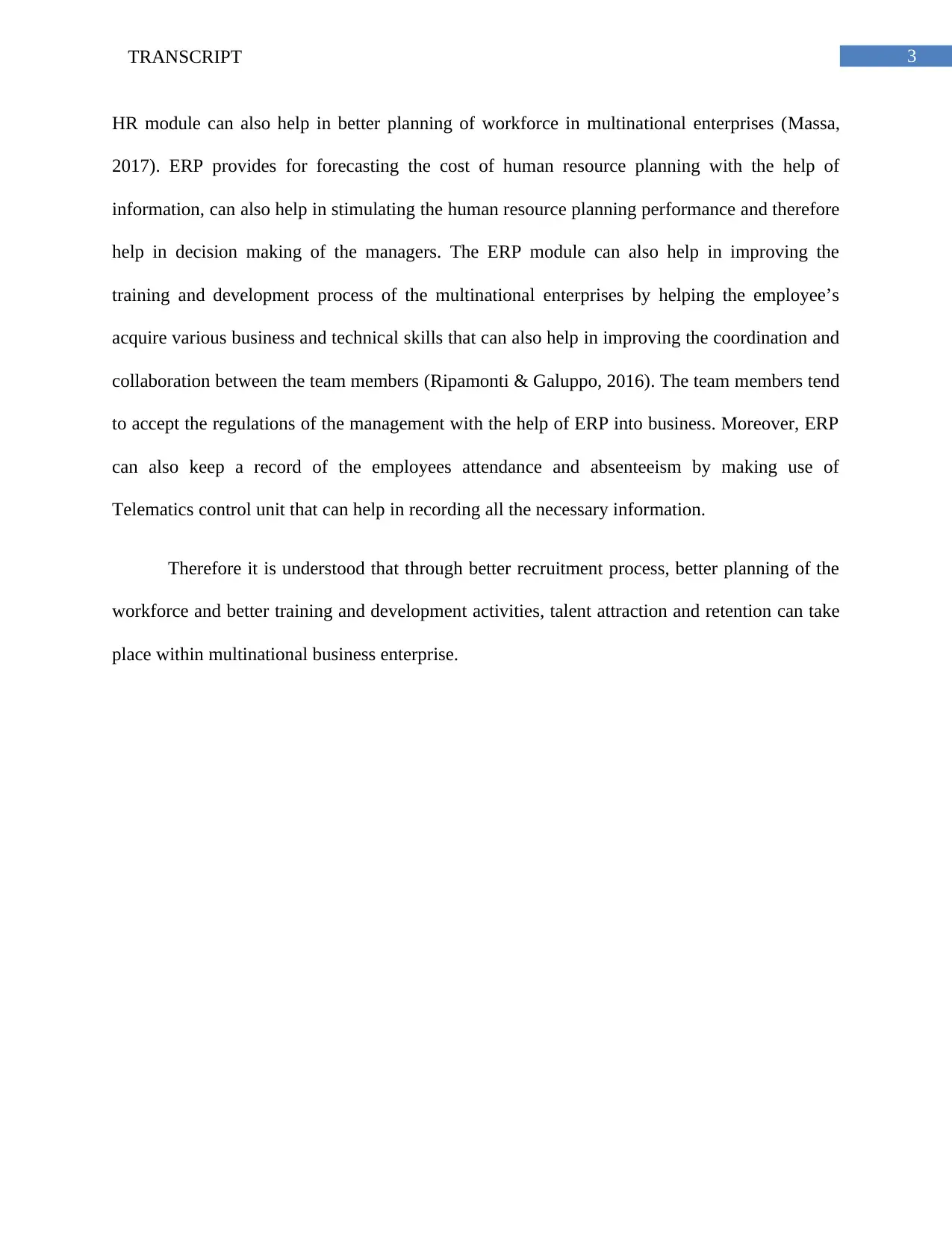
3TRANSCRIPT
HR module can also help in better planning of workforce in multinational enterprises (Massa,
2017). ERP provides for forecasting the cost of human resource planning with the help of
information, can also help in stimulating the human resource planning performance and therefore
help in decision making of the managers. The ERP module can also help in improving the
training and development process of the multinational enterprises by helping the employee’s
acquire various business and technical skills that can also help in improving the coordination and
collaboration between the team members (Ripamonti & Galuppo, 2016). The team members tend
to accept the regulations of the management with the help of ERP into business. Moreover, ERP
can also keep a record of the employees attendance and absenteeism by making use of
Telematics control unit that can help in recording all the necessary information.
Therefore it is understood that through better recruitment process, better planning of the
workforce and better training and development activities, talent attraction and retention can take
place within multinational business enterprise.
HR module can also help in better planning of workforce in multinational enterprises (Massa,
2017). ERP provides for forecasting the cost of human resource planning with the help of
information, can also help in stimulating the human resource planning performance and therefore
help in decision making of the managers. The ERP module can also help in improving the
training and development process of the multinational enterprises by helping the employee’s
acquire various business and technical skills that can also help in improving the coordination and
collaboration between the team members (Ripamonti & Galuppo, 2016). The team members tend
to accept the regulations of the management with the help of ERP into business. Moreover, ERP
can also keep a record of the employees attendance and absenteeism by making use of
Telematics control unit that can help in recording all the necessary information.
Therefore it is understood that through better recruitment process, better planning of the
workforce and better training and development activities, talent attraction and retention can take
place within multinational business enterprise.
Paraphrase This Document
Need a fresh take? Get an instant paraphrase of this document with our AI Paraphraser
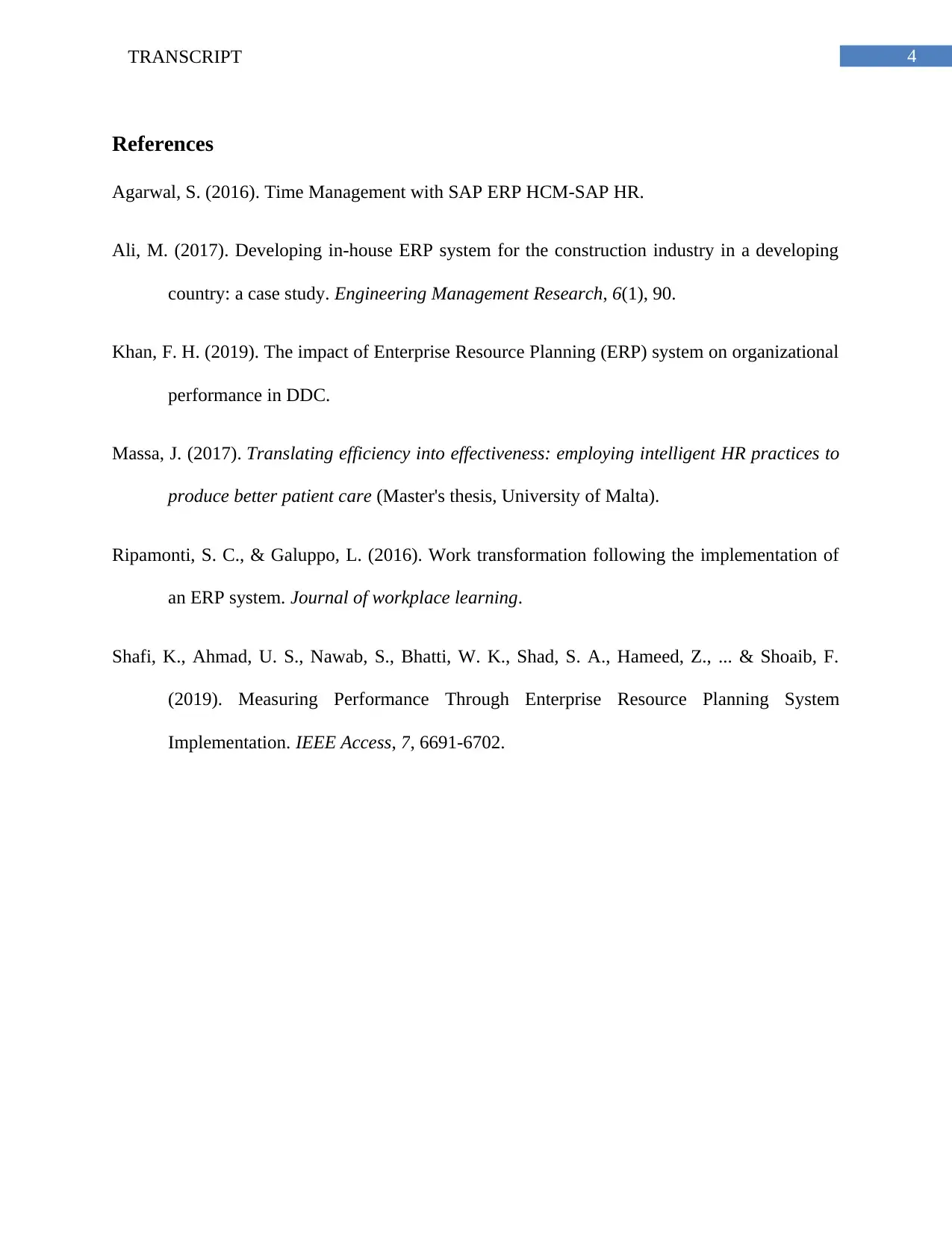
4TRANSCRIPT
References
Agarwal, S. (2016). Time Management with SAP ERP HCM-SAP HR.
Ali, M. (2017). Developing in-house ERP system for the construction industry in a developing
country: a case study. Engineering Management Research, 6(1), 90.
Khan, F. H. (2019). The impact of Enterprise Resource Planning (ERP) system on organizational
performance in DDC.
Massa, J. (2017). Translating efficiency into effectiveness: employing intelligent HR practices to
produce better patient care (Master's thesis, University of Malta).
Ripamonti, S. C., & Galuppo, L. (2016). Work transformation following the implementation of
an ERP system. Journal of workplace learning.
Shafi, K., Ahmad, U. S., Nawab, S., Bhatti, W. K., Shad, S. A., Hameed, Z., ... & Shoaib, F.
(2019). Measuring Performance Through Enterprise Resource Planning System
Implementation. IEEE Access, 7, 6691-6702.
References
Agarwal, S. (2016). Time Management with SAP ERP HCM-SAP HR.
Ali, M. (2017). Developing in-house ERP system for the construction industry in a developing
country: a case study. Engineering Management Research, 6(1), 90.
Khan, F. H. (2019). The impact of Enterprise Resource Planning (ERP) system on organizational
performance in DDC.
Massa, J. (2017). Translating efficiency into effectiveness: employing intelligent HR practices to
produce better patient care (Master's thesis, University of Malta).
Ripamonti, S. C., & Galuppo, L. (2016). Work transformation following the implementation of
an ERP system. Journal of workplace learning.
Shafi, K., Ahmad, U. S., Nawab, S., Bhatti, W. K., Shad, S. A., Hameed, Z., ... & Shoaib, F.
(2019). Measuring Performance Through Enterprise Resource Planning System
Implementation. IEEE Access, 7, 6691-6702.
1 out of 5
Related Documents
Your All-in-One AI-Powered Toolkit for Academic Success.
+13062052269
info@desklib.com
Available 24*7 on WhatsApp / Email
![[object Object]](/_next/static/media/star-bottom.7253800d.svg)
Unlock your academic potential
Copyright © 2020–2026 A2Z Services. All Rights Reserved. Developed and managed by ZUCOL.





